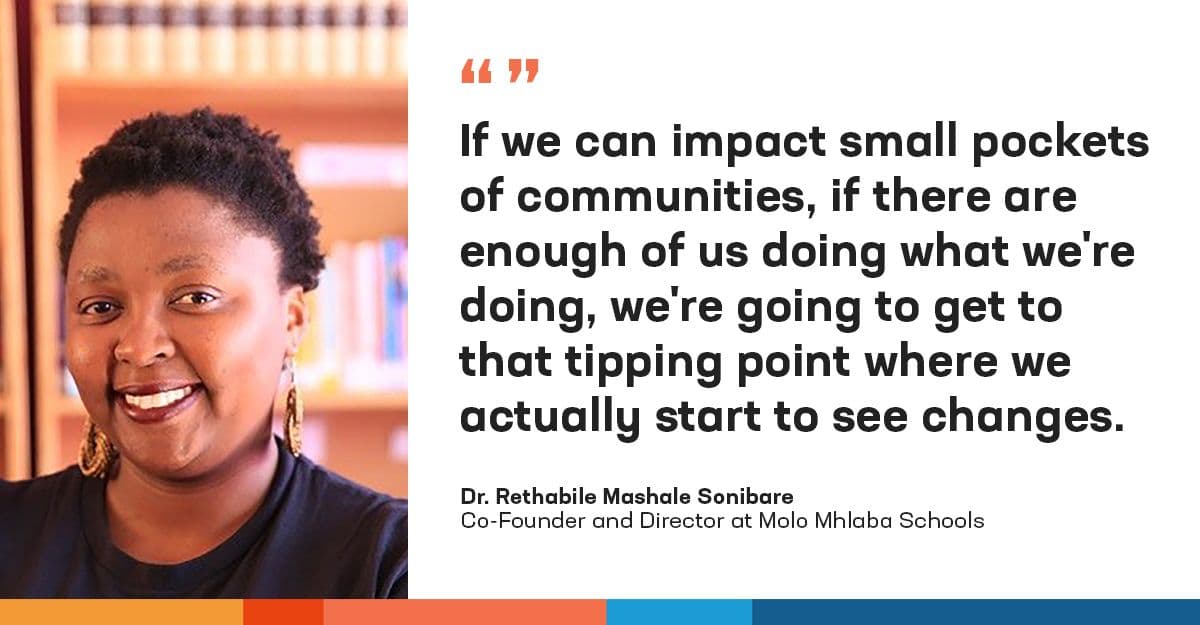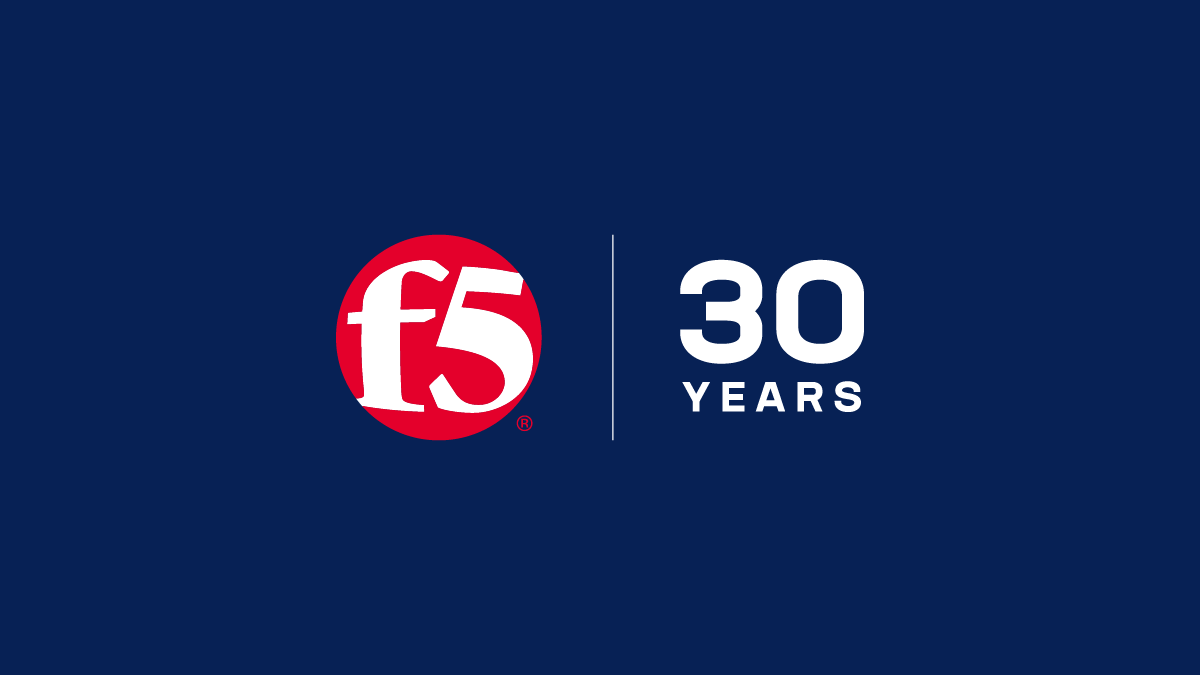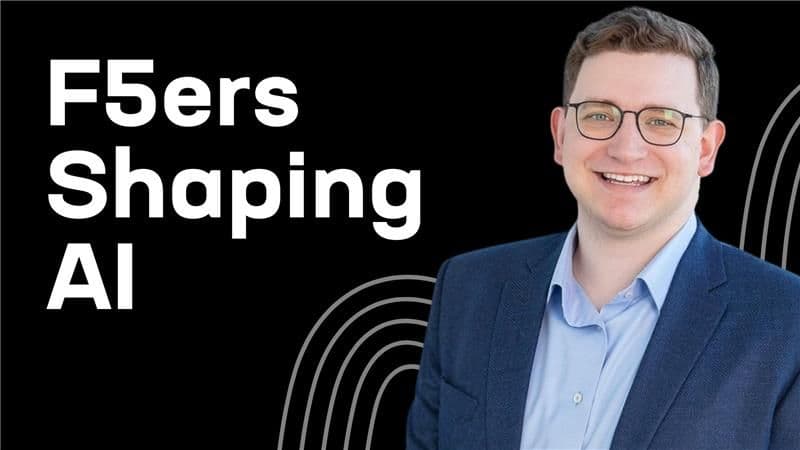Dr. Rethabile Mashale Sonibare is the co-founder and Director of Molo Mhlaba Schools, a pioneering non-profit organization providing STEAM education to young girls in Khayelitsha, South Africa.
To coincide with Youth Month in South Africa and International Women in Engineering Day, F5 caught up with Dr. Mashale Sonibare to learn more about her career, the impact of Molo Mhlaba schools, and her plans for the future.
F5 is a proud supporter of Molo Mhlaba Schools, which has been an F5 STEM Education Grant Partner since 2019 via our Global Good Program.
Where did you grow up and how did it help to shape your direction in life?
I grew up in Khayelitsha in the late 1980s and early 1990s. I was fortunate to get a scholarship to go to a private school in Cape Town, which was one of the very few that allowed black students onto their campus at the time.
As a result, I was living in two opposite worlds. In the morning I would commute to a really affluent, well-to-do school and, in the afternoon, I would come home to the township and be faced with tremendous poverty. It was a bad state of affairs. So, I grew up with an ingrained sense of injustice, realizing that there is so much inequality in the world—so many haves and have-nots.

How did you adapt to your new school environment?
I knew that I was fortunate. My family also constantly reminded me of how privileged I was. Everybody was investing their hopes and dreams of education in me. I was going to be the one that would end poverty for our family.
However, when I got to high school, I became agitated. When you go through adolescence and the teenage years, you’re always struggling with identity. And, for me, it wasn’t just a regular teenage struggle. There was also racial contention and gender issues, especially as I was a black woman in a predominantly white, very affluent school. I had to quickly learn to deal with all the issues that came with that.
On top of that, I knew that I had a responsibility to my family and my community. I had to do well— to excel in everything I did, and I had to be top of my class. When I came back with less than 70% or 80%, my mom would always ask who got the top mark in the class. I’d tell her, and she’d say, “Did they have two heads? Why couldn’t you get that top mark?”. There was a lot of pressure! The expectation was that you always had to be at the top of your game and always do the best that you could. Looking back on this time, I also realize the fear that gripped my mother from living in a township. To this day, I wonder how I made it out of that situation alive. Many of my peers died young due to violence and the HIV/AIDS pandemic.
How did these experiences influence your move into social activism?
My career and worldview were definitely shaped by being constantly exposed to all these contradictions and polar opposites. I realized early on that I wanted to work at equalizing the educational playing field for everybody, especially for young women.
The school I attended opened up opportunities for me to go to a really good university and secure a scholarship to study further. At the end of it, I could have done anything. I had many choices, but I knew that I needed to do something with a social responsibility dimension to it.
Eventually, I ended up studying social work and I got my degree. I did my honours, my masters and my PhD. By that time, the situation in South Africa was becoming more urgent.
Post-1994, the country was getting better at data collection, sharing information and addressing educational issues. But in my lived reality—I never left Khayelitsha to live elsewhere—nothing much changed. Teenage pregnancy was everywhere, HIV was still crippling people, unemployment was still high, and substance abuse was rampant.
So, the situation was getting better for some in the country, but not everybody. In Khayelitsha, which is quite a populous area, it was definitely getting worse. While we were getting things like piped water, toilets, and roads, it wasn't changing the lived experiences of people—particularly for young children. As our democracy was growing, so was the rate of inequality. Townships were mushrooming as people moved from rural areas to seek economic opportunities in the cities.
That’s why, when you talk about the future and the ‘rainbow nation’, you end up wondering how people can participate in it when it seems so far away. For girls, they end up going into the professions that our mothers and grandmothers had, which is menial labour. How do you disrupt that cycle and change things for generations to come? These are the types of questions I was dealing with when I was going into the world of work.
What was the genesis of Molo Mhlaba schools?
In 2012 I had my daughter, and things became even more urgent. I told myself, I'm living in Khayelitsha, and my child is going to have the exact same experience as me. So, what does that mean? As a social worker, as a member of my community, and as someone who has had some opportunities extended to them, what responsibility do I have? These were the issues that were keeping me awake at night.
It was then that I decided to start running an after-school programme for girls. It was really a kind of research project to learn more about the challenges young black girls were facing, and how we could improve their lives through access to opportunities and labour markets that have been historically unavailable to them.
What was the focus of the after-school programme?
We ran experiential courses on topics like robotics and coding, and then it grew more into a tutoring programme. As we continued to grow, we introduced a reproductive health programme with psychosocial elements. We also had a parent training programme.
It grew to become this massive after-school programme, reaching 16 primary schools and over 700 girls every year. However, it soon became clear that we were working with kids who were in schools that weren't thriving. It was like trying to put a plaster on a bullet wound.
I knew we needed to look at how we could control the curriculum and improve the quality of education they were receiving. We needed to look at a whole school model rather than just an after-school component. The cost base was actually starting to look quite similar too. You're paying for teachers, and you're feeding the kids and providing them with uniforms. But if you don't control the school day, what quality are you actually producing? It’s one thing to look like you're doing something amazing because the branding is great. But when you go to bed at night, have you really made a difference?
How did the early years of Molo Mhlaba go?
We started piloting a school within a school, and between 2016 and 2017 we began working with pre-kindergarten kids and first graders. We soon realized that the kids in our groups were doing much better than the rest of the school.
After two years, we started exploring what an expansion could look like. We moved out of the primary school we were based in and that’s how Molo Mhlaba was born. We started quite small with four kids. In the first month that grew to 38 and we’ve been expanding ever since. This year, we have 112 girls enrolled at the school.
How important is the location of the school?
Location is really important. That is a non-negotiable part of our model. The schools have to be located where the girls live. We are offering a model of what good education can look like in a township. There’s a myth that you can’t offer quality science, technology, engineering, art and mathematics (STEAM) education here because it is not safe. But the infrastructure is never going to exist if we don’t start to advocate for it and demonstrate the benefits.
The reality for a lot of people is that they're going to live within the township boundaries for a really long time. So how do we make them into habitable environments that are conducive for people having meaningful places to work, live, and play? And hopefully, when the kids leave our school, they'll go on to do things that will ultimately change our communities. For example, it’s great that you want to be a doctor. But what kind of doctor are you going to be? Are you going to be somebody who just makes a lot of money and doesn’t care about the world, or are you going to be working on solutions that can actually change and improve the lives of millions of poor people?
How does the influence of Molo Mhlaba extend beyond the core programme?
I believe strongly that we have a social responsibility, even as a non-profit school, to go beyond what we're doing. That is why we’re also running our Molo Mhlaba Outreach programme, which has reached over 500 additional students. We have a responsibility to local children that go to state-run schools and won’t have access to the benefits of our curriculum. We work with grade five to grade seven learners, running after-school programmes covering topics like robotics, computer programming, astronomy, mathematics, and English. In the COVID era, we also learned that a lot of our work can be done remotely. At the end of the day, we are a model for what a low-cost STEAM school can look like. If the state schools that we work with want to follow our lead, they will have a template.
What is the scale of the challenge for young girls looking to get a quality education in South Africa?
In South Africa, every year, we’ve got 12 million children enrolled in the education system. Only about 500,000 of those go to private schools, and the rest are in state schools.
What we're seeing every year, is that around 50% of the children that come into school don't graduate 12 years later. They don't finish high school, and we don't know where they go to. The majority are girls, around 60% to 70%. They drop out for a number of reasons, mainly teenage pregnancy or having to become caregivers at home. This is exacerbated by the fact that schools themselves aren't conducive spaces for all children. It's an Africa-wide problem. If we're not addressing systemic and infrastructural challenges, how do we expect to produce great educational outcomes and create jobs?
Are you optimistic that things will change for the better?
I'm quite optimistic about the gender divide in education on the continent, particularly in South Africa. In South Africa, we have nearly reached gender parity when it comes to primary school enrolment. We are really good at getting children into school, but we are struggling with keeping them in once they are admitted. There are also a lot more activists coming through, including people doing similar work to us. A lot more attention is being paid to the challenges of education than a decade ago.
We can't blame the government for everything. We need to proactively offer solutions that are going to make a difference where we are. You don't need to think countrywide, you just need to think community-wide. If we can impact small pockets of communities, if there are enough of us doing what we're doing, we're going to get to that tipping point where we actually start to see changes. But it's not a one generation fix. We need about two or three generations to be able to see the real impact.
However, it is encouraging that more people want to make a difference now. Suddenly, it doesn’t feel like we are on our own. It doesn't feel like we're the outliers trying to change the world by ourselves. It’s a shared problem, and my optimism comes from knowing that there's a lot of restlessness about the status quo.
What are your future plans for Molo Mhlaba?
We have an ambitious vision that, by 2028, we will grow our model to ten ‘micro’ STEAM schools accommodating around 200 students per campus. A key part of our strategy is to adapt to the infrastructure of the townships, where often there are not many large buildings and there is not much land available. It will be a model for how schools can function in high-density communities like Khayelitsha.
At the moment we’re fundraising to build our first campus, which we’re calling the Molo Mhlaba Dream School. We’ve purchased a 1000 square metre plot of land and hope to move ahead with the development soon. By 2028, we hope to have an evidence-based financial model that we can show to the government and encourage them to support similar initiatives across the country.
Our ultimate measure of success is to ensure that our girls, when they leave school, go to high-impact mathematics and science high schools, and that they then go on to university to pursue STEAM careers. We’re four years from graduating our first cohort of primary school girls, so there’s quite a big learning curve ahead of us.
What advice to you have for young girls that want to succeed in STEAM?
You need to believe in yourself and that you can do it. Everything is about learning, practising, and perfecting. Don’t be scared to take chances. Remember, STEAM is for everybody. It’s not for a select few or for the rich or just for boys.
Additional information
- To hear more about Dr. Rethabile Sonibare Mashale’s work, check out her recent radio interview on South Africa’s 702.
- You can also learn about Molo Mhlaba here: https://molomhlaba.org/
About the Author
Related Blog Posts

30 years of F5 through the eyes of F5ers
As F5 celebrates its 30th anniversary, we asked employees, including several who’ve been here for decades, what it means to thrive at F5. Read on to see their answers.

F5ers shaping AI: A Q&A with Hunter Smit on culture, growth, and meaningful work
From college discovery to shaping F5’s AI platform story, Hunter Smit shares how purpose, integrity, and people-first values define life at F5.
F5 strengthens commitment with UK Armed Forces Covenant signing
F5 has underlined its commitment to the UK defence sector and service personnel by officially signing the Armed Forces Covenant.

F5 Celebrates the CRN 2023 Women of the Channel
F5 is proud to applaud members of the F5 Channel Team receiving recognition via the 2023 Women of the Channel Awards
Now Celebrating: F5 North America 2021 Partner Awards
F5 recognizes the standout partners who have demonstrated exceptional expertise, commitment, and impact.
Outsmarting Your Unconscious Bias – a Q&A with Valerie Alexander
Entrepreneur, author and TED alumna, Valerie Alexander shares her journey and insights on unconscious bias with the wider community in this interview.